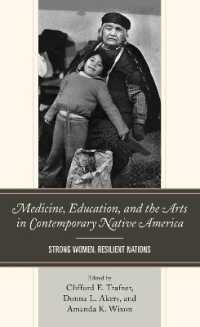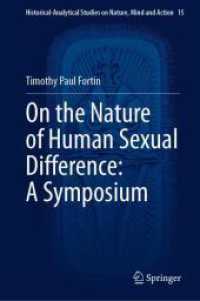Full Description
Eight United Nations human rights treaty bodies (UNTBs) can currently examine 'communications' (complaints) from individuals against states. This edited collection is the first in-depth analysis of the evidentiary regimes developed within this procedure. Nine case studies underscore the weak evidentiary basis of the UNTB decisions and the importance of addressing this issue, while the final chapter offers a set of practical recommendations. Grounded in academic research and legal practice, the volume incorporates doctrinal, critical, socio-legal, and anthropological perspectives. It provides an authoritative reference on UNTBs, whilst aiming at contributing to the strengthening of their evidentiary norms and practices. The title is also available open access on Cambridge Core.
Contents
1.Studying evidence in the UNTB individual communications procedure: why this book, what it offers Deborah Casalin, Marie-Bénédicte Dembour and Cornelia Klocker; 2. Evidencing pushbacks? Why fair, clear and consistently-applied burdens and standards of proof are essential to human rights adjudication Marie-Bénédicte Dembour and Hanaa Hakiki; 3. UN treaty bodies' 'sufficiently substantiated' admissibility requirement: endorsement or distortion of the prima facie threshold? Lisa Reinsberg; 4. Forty years and counting: CERD's ongoing search for a clear evidentiary path Cornelia Klocker; 5. The working group on arbitrary detention's treatment of evidence: a three-phase history of increasing sophistication Matthew Gillett, Yutaka Karukaya, Mia Marzotto; 6. Reversing the burden of proof in response to state non-participation: recent evolutions in the human rights committee's examination of individual torture claims Kasey McCall-Smith; 7. It's all been done? Individual communications, the exhaustion rule and a new methodology expanding and evidencing domestic barriers to justice Meghan Campbell; 8. Not just single events: calling on UN treaty bodies to expose patterns or practices of violations Christopher Roberts; 9. The polluting effect of stereotypes on evidence: CEDAW'S efforts to address gender-based discriminatory narratives Elena Ghidoni; 10. The dangers of distant evidence: the UN human rights committee's individual communications, 512,000 potential new Sámi voters and other 'objective' facts Miia Halme-Tuomisaari and Reetta Toivanen; 11. Practical recommendations for greater fairness, accessibility, and transparency in the UN treaty bodies' evidentiary norms and practices Lisa Reinsberg, Hanaa Hakiki and Vincent Ploton.







